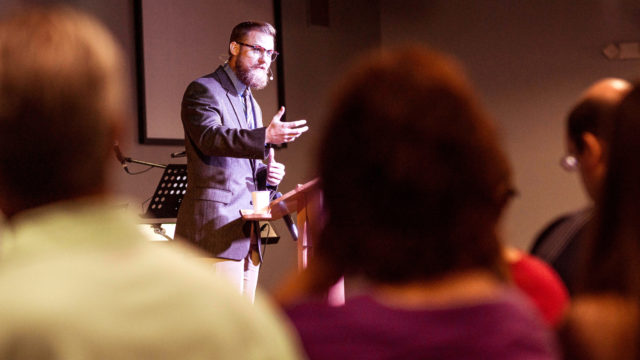It Is Finished
John 19:30
Preached at Main Street Church on Easter Sunday, April 21st, 2019
“When Jesus had received the sour wine, he said, ‘It is finished,’ and he bowed his head and gave up his spirit.”
- The gospel of John was written by the Apostle John, who many scholars consider to be the best friend of Jesus.
- In John 19 Jesus was put on trial by the Roman Governor Pontius Pilate, and everyone there, spurred on by the chief priests and religious leaders, demanded his execution.
- So pilate handed Jesus over to be crucified.
- They whipped him, beat him, mocked him, gambled for his clothes, and nailed him to a cross between two criminals.
Verse 28 says, “After this, Jesus, knowing that all was now finished, said (to fulfill Scripture), ‘I thirst.’ A jar full of sour wine stood there, so they put a sponge full of the sour wine on a hyssop branch and held it to his mouth. When he had received the sour wine, he said, ‘It is finished,’ and he bowed his head and gave up his spirit.”
It’s Easter Sunday, and Jesus is alive. Do you have any Easter Traditions? Maybe you dye eggs, or perhaps your family always has an Easter Ham, or maybe your Easter tradition is make sure you wear bright pastel colors on Easter Sunday and take a family picture.
This year Brittany and I took our kids to participate in the age old Easter tradition: the Easter egg hunt. And JJ definitely stood out from the rest of the 2 and 3 year olds looking for eggs, not because of his egg hunting skills, but because while all the other kids parents had given them festively decorated Easter baskets, his mother and I had given him an Aldi bag.
Who knows, maybe the Aldi bag will become part of our Easter tradition; because you know, different people have different traditions to celebrate Easter, and all around the world, people have different Easter traditions.
When I was 16 years old I spent Easter in the Philippines because I was there for a mission trip, and I got to see some of the Easter traditions there. The Philippines is a country in Southeast Asia, it’s a group of over 7600 islands in the West Pacific ocean, and it’s actually the 12th largest country in the world by population. It’s got about 100 million inhabitants. Great food, great people, and a tropical island climate. Parts of the Philippines are like paradise.
Since I was there for Easter I got to see firsthand some of the Easter traditions, and there was one I encountered that I had never seen before. Every year on Good Friday, hundreds of people take to the streets of Manila to participate in a practice called self-flagellation. And what they do is they take whips and whip themselves on the back. And they take bamboo rods and strike themselves until they bleed. And they put on crowns made of thorns that dig into their scalps. And some of them will twist barbed wire around their ankles and their wrists and then tie it to cinder blocks, and they’ll crawl on their bellies on broken glass, dragging the weight of the cinder blocks through it all. And when they reach the end of their route, some of them will have themselves tied to a cross where they will imitate the suffering of Jesus. And the question is: why would they do that?
A news article that came out of Manila just last Friday says this: “Hundreds of penitents whipped their wounded backs to atone for their sins or secure God’s help for special attention.”
Every year hundreds of people in the Philippines physically beat themselves up to try to earn God’s forgiveness. They feel so unworthy of God’s love, and so unworthy of God’s forgiveness, that they try to bear the burden of their sin on themselves.
I suspect that many of us in here feel so unworthy of God’s love that we try to bear the burden of our own sin in a different way.
- We might not beat ourselves with bamboo rods, but maybe you beat yourself up with guilt.
- That thing you said when you were stressed out. *whip* That relationship you didn’t put enough effort into. *whip* That time when you weren’t there…and you should’ve been. *whip*
- We might not drag around cinderblocks tied to our hands and feet, but maybe you’ve spent your whole life dragging around shame tied to the mistakes you’ve made and the sin you’ve committed.
- I can never forgive myself. My life will never count for anything. If other people knew the things I’ve done they would never accept me.
- And you know sometimes as Christians, we can make people feel like they need to pay for their sins before they can come into the church. Like they need to keep the cinder blocks of their past securely fastened.
- But friends, that’s not what Good Friday or Easter is about at all. And that’s exactly what Jesus tells us in these last words he spoke on the cross: “It is finished.”
As Jesus hung on the cross John tells us in verse 29: “Jesus, knowing that all was now finished, said (to fulfill Scripture), ‘I thirst.’”
- Jesus had suffered, he had become cursed on the cross and paid the penalty of sin, and he had been forsaken by his heavenly Father. Because he had done all that, he knew that all was now finished and said I thirst.
“A jar full of sour wine stood there, so they put a sponge full of the sour wine on a hyssop branch and held it to his mouth.”
- The last thing Jesus had to drink up to this point, was the sweet wine of the New Covenant that he shared with his disciples at the Last Supper. Now he drank the sour, bitter wine of crucifixion completely alone.
“When he had received the sour wine, he said, ‘It is finished,’
- On the cross Jesus declared, “It is finished.”
- In Greek it is one word: tetelestai
- It comes from the verb ‘teleo’ which means to bring to an end, to complete, to accomplish.
- It doesn’t just mean “it’s over” it means, “I accomplished exactly what I intended.”
- Jesus used this word in the perfect tense, which means it was finished in the past, is still finished in the present, and will remain finished in the future. The result is ongoing.
The word was full of significance and meaning in ancient Greco-Roman culture and was used in a few ways:
- A servant would say ‘tetelestai’ when asked by his master if he had finished the work he had been assigned. It is finished.
- A judge would say ‘tetelestai’ when announcing that a sentence of judgment had been completed. It is finished.
- A priest would say ‘tetelestai’ when telling someone that a sacrifice was pleasing and acceptable to God. It is finished.
- A bookkeeper would say ‘tetelestai’ to declare that a debt had been “paid in full.” It is finished.
- A soldier would say ‘tetelestai’ as a battle cry over a vanquished enemy. It is finished.
On the cross Jesus said, ‘tetelestai,’ because he finished all of it.
- Jesus said to his Father in John 17, “I have finished the work you gave me to do.” (John 17:4)
- Jesus finished the work of a divine servant by living a perfect, sinless life.
- Paul wrote, “Since, therefore, we have now been justified by his blood, much more shall we be saved by him from the wrath of God.” (Romans 5:9)
- Jesus finished the work of a judge, by taking the wrath of God in our place.
- The book of Hebrews says “(Jesus) appeared once for all at the end of the ages to put away sin by the sacrifice of himself.” (Heb. 9:26)
- Jesus finished the work of a priest by becoming the sacrifice for our sin.
- Colossians says “God…(has) forgiven us all our trespasses, by canceling the record of debt that stood against us with its legal demands. This he set aside, nailing it to the cross.” (Colossians 2:13-14)
- Jesus finished the work of a record keeper, by paying all our debts in his body on the cross.
- Colossians says that on the cross Jesus “disarmed (his enemies) and put them to open shame, by triumphing over them.” (Colossians 2:15)
- Jesus finished the work of a conquering king by rising from the dead and showing that death could not hold him.
On Friday Jesus said “It is finished,” and on Sunday God said, “it is finished indeed!”
Where in your life are you acting like the work of Jesus isn’t finished?
- Are you living a life based on guilt?
- Not being there for your family; That conversation you never made time for; That thing you know God wanted you to do, but you were afraid.
- Are you living your life dragging around the cinder blocks of shame?
- That failed marriage from years ago. Those mistakes you made when you were younger. That one night stand. Those times you drank too much. Those words you said in anger.
Two blocks from here is the St. Charles County Jail. A month ago I walked up the hill over there to visit a man who had been there for five months, waiting to hear what his final sentence would be. He had a laundry list of all kinds of charges—all non-violent offenses. In fact, the reason he had been waiting for his sentencing for so long was precisely because more charges against him kept coming up.
But when I saw him, he was in a good mood, because it seemed like his time in the jail was almost finished. He only had one week left before being released on parole. The week came and went and I never heard from him. Last Wednesday I got a call from the jail saying that he was still there and he wanted me to visit.
So on Good Friday I walked up a hill to visit a man, a confessed criminal, who was still behind bars because the penalty for his crimes still was not finished.
As we talked on the phones through bulletproof glass I asked him what happened. He said they had discovered more charges against him from his past and he would be locked up even longer. And he said, “I just want it to be finished.”
Some of you are locked in the prison of shame and guilt that continually tells you that it’s not finished. And as soon as you think it might be, the enemy drudges up things from your past to pile on to your list of sins. “Remember that thing you did? It’s not finished.” And you feel so unworthy of God’s love that you have dragged around the shame and guilt of your sins for your whole life.
Jesus commands you from the cross, to let those things go, because he has declared that it is finished. You, Christian, must realize that when the gospel offers forgiveness, it also means you can forgive yourself. Why? Because what God thinks of you is more important than what you think of you. Don’t put yourself in God’s place by standing as judge over yourself. If God has declared you forgiven in Christ then it is not up to you to withhold forgiveness from yourself.
Since Jesus said “it is finished” we must not add anything to his perfect finished work.
God’s Word says in the book of Hebrews:
- Christ made the sacrifice for sin once for all when he offered up himself. (Heb. 7:27)
- No more sacrifices: It is finished.
- Christ secured eternal redemption once for all by means of his own blood. (Heb. 9:12)
- Your redemption is secure: It is finished.
- Christ appeared once for all to put away sin by the sacrifice of himself. (Heb. 9:26)
- Your sin is forgiven: It is finished.
- We have been sanctified through the offering of the body of Jesus Christ once for all. (Heb. 10:10)
- There’s nothing you can offer God: It is finished.
The final way that the word ‘tetelestai’ was used in the first-century was by master artists. An artist would say ‘tetelestai’ when he finished a work of art in order to announce: “It’s perfect. It’s complete. Nothing else is needed.”
Perhaps you’ve noticed this painting up here.
The Mona Lisa is said to be the most talked about, most visited, most written about, most parodied, most well known work of art in the whole world. It was finished by the Renaissance artist Leonardo Da Vinci in the early 1500’s he painted this masterpiece and it is in the Louvre in Paris, visited by people all over the world.
You know people have actually tried to damage the Mona Lisa; they’ve tried to vandalize it by throwing acid at it, or different objects, so this masterful work is actually kept in a climate controlled case of bullet proof glass.
Now obviously this isn’t the real Mona Lisa—the real Mona Lisa is valued at 782 Million dollars, making it by far the most valuable work of art in the whole world. But just imagine I called the Louvre and asked if I could borrow the Mona Lisa so we could look at it and admire it, and they granted me permission, so I brought it here for us to admire. And as I look at it I start to think to myself, “Man I’m glad they let us take it out of the case to take a closer look at it, because as I look at this thing, I think I could definitely make some improvements on it…”
*Add various marks and additions to the painting*
And as I look at that I might say, “man that looks way better than the original.” And if I did that to the real Mona Lisa, people all over the world, from every corner of the globe would be in an outrage!
They would say, “Casey you’re not an artist! You can’t add to the master, Leonardo Da Vinci’s, work!’ You have no right to add to his perfect work. Who do you think you are to add to the perfect, finished work of Leonardo Da Vinci?
And I can ask you, who do you think you are to add to the perfect, finished work of the Lord Jesus Christ by trying to bear the burden of your guilt and your shame on yourself.
Friend, when you hang onto that guilt, and regret, and shame, and try to make up for your own sins, it’s like taking crayons to the finest masterpiece in the whole world. And it is infinitely worse to add to the work of the atonement of the cross of Christ, then to add to a painting by a man. Stop dragging around the shame and the guilt for sins that God is able to forgive you of.
Jesus didn’t say, “I’ve done my part now it’s time for you to do yours.” He said, “It is finished!” And after he finished his work, God raised him from the dead to give the gift of resurrection life to everyone who believes in him.
God gave his son whom he loved to die on the cross in your place, and bear the burden of your sin, and to finish the work of atoning for your sins, so that there is nothing left for you to do.
And the same John that recorded these words of Jesus wrote this, “If we confess our sins, he is faithful and just to forgive us of our sins and cleanse us from all unrighteousness.” (1 John 1:9)
There’s nothing left for you to do. There’s nothing left for you to add. In Christ, you are redeemed, and it is finished.


